Ode to the mysterious: exploring the secrets of alchemy and dark matter
Disclaimer. The editors of The Global Technology magazine categorically declare that this work is a satirical fantasy and should not be taken seriously, except for all the scientific moments contained in it. Before you injure anyone because of this fantasy trifle, remember that even the Creator has a sense of humour, he certainly loves to play chess and is always favourable to spectacular scientific muses.
Ode to the Mysterious
Chapter One The Light Outcasts and the Dark Unforgiven ones
‘This time, let the black piece move first. You like to play against the rules, don’t you?’ said a wizard-like white-bearded Elder, pointing to a chessboard.
‘What is this? Alms for a former Angel?’ grinned a young man with a piercingly cold gaze and sipped whiskey from a cracked glass.
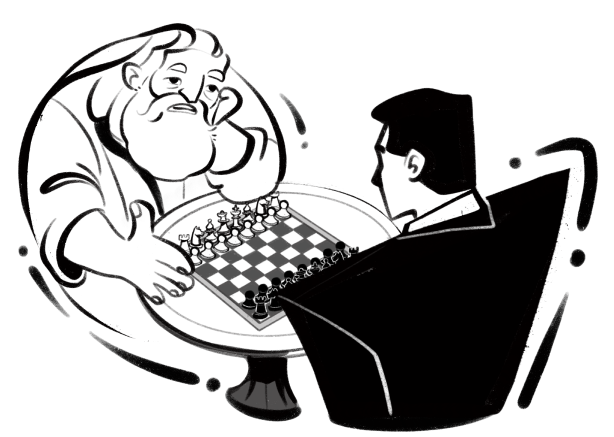
These two used to gather from time to time in a bar on a wasteland to break through the layers of stale air and cigarette smoke, playing chess to old worn-out records. And the place itself was conducive to a leisurely and thoughtful game: on the site of the bar there was once an estate of a rich lord, who, for some unknown reason, cut down all the trees on his land, dismissed all the servants, after which he went up to his room on the top floor, covered himself with a blanket and was never seen again.
There were never many people in the bar, either because the history of the building in which the drinking establishment was located seemed frightening, or because strange things almost always happened in the bar.
But that did not frighten the calm, wise old man and the deliberately attractive Angel in dark clothes.
‘Well, where will you start?’ the Elder asked and moved the chessboard closer to the former Angel, but he moved it away with a sharp gesture of his hand.
‘Don’t,’ he answered. ‘I haven’t forgotten how to play yet.’
There was a creak and the Elder saw how the black king chess piece slowly moved to one of the squares. The figure was moving confidently forward, controlled by the steely gaze of the fallen Angel, who, as soon as the piece took its place, loosened his grip.
‘The black king,’ the Elder said with admiration.
‘Why waste talents on trifles?’ the Angel asked, not without pride, and looked at the Elder with a challenge.
‘Well, then my move will be the following,’ the Elder said slowly and reached out his hand to the white chess piece. ‘Try to make a white artist dark. The white artist whose soul is as pure as a baby’s and who only needs people to be able to contemplate the beauty of this world.’

‘Ooooh,’ the Wingless grinned contentedly, watching the Elder place a white piece on his part of the chessboard. ‘And you are still partial to these creative mediocrities, aren’t you?’
Paying no attention to the grins of the fallen Angel, the Elder continued to move white pieces across the chessboard:
‘Let this artist have a family…’
’Which will starve,’ the Angel moved the black pawn forward with an effort of will.
‘Let the artist paint the lives of ordinary people, and flowers, and memorable moments in history,’ the Elder deftly moved the chess bishop piece forward.
‘And let no one need his paintings,’ the Angel continued with excitement, moving another pawn forward.
The Wingless Angel liked the game, because what happened on the chessboard happened to people in real life. The Angel never understood why the Elder took each game calmly, because more often than not the Elder lost, and along with him, the pieces he endowed with kind, human qualities lost too.
At some point, the former Angel felt sorry for his chess partner, because his endless faith in people always ruined everything. A couple of times, the Wingless even caught himself thinking that he desperately wanted to show his opponent all the barbarity of the human soul, its true dark side, so that the Elder would finally stop considering people ideal creatures. That is why he threw the most sophisticated hardships to the chess pieces and came up with the most cruel conditions for them.
But the Elder silently rocked in his comfortable chair looking with interest at the fireplace left by the disappeared lord. When another wood chip was thrown into the fireplace, and the fire gently extended its fiery palms to meet the players, the Elder broke the silence.
‘But in our game, a stalemate may occur in a couple of steps, and then the game will end in a draw. And the artist’s story too. He will live an ordinary mortal life and …,’ the Elder did not have time to finish speaking, as he saw that the Angel was staring at the chessboard in the hope of turning the outcome of the game in his own, mystical direction.
‘Found it! Found it!’ Wingless exclaimed joyfully, and pounded his icy palms on the chess table. ‘This artist will find his fame and get money, but no one will ever want to remember his name.’
‘I wonder how you plan to do this,’ said the Elder, watching as the Wingless confidently placed the black chess piece on the field. ‘Creators, they are like children, the main thing for them is to come up with something, draw, and invent, your antics are alien to them.’
But the Angel continued to rearrange the black pieces on the chessboard so that the light piece of the Elder was surrounded by a dark ring of gloomy events called “CHOICE”.
‘Look,’ said the Wingless, rubbing his hands with glee, ‘You gave everything to your light artist, everything: a priceless gift, canvases, brushes, but your chess piece dreamed of only one thing – to escape poverty and become a respected person.’
‘Van Gogh also lived a hard life, but he managed to get through your traps,’ the Elder began to object.
‘Van Gogh was a genius,’ the Angel abruptly interrupted the Elder. ‘He really dreamed of showing people the beauty of this world, that’s why he is Great now, and not then. People needed to survive, and not watch the golden rays of the sun cut the flowering field in half.’
The angel looked away at the antique clock hanging above the fireplace: the clock had stopped at 21:25.
‘It’s all coming together,’ the Wingless winked at the clock and stood up from the chess table. ‘It was at this time that your light character began to think about what to draw to earn a living and for his studio. You yourself suggested that your artist live in a small town and occasionally sell paintings to tourists. So, tourists simply did not buy beautiful paintings, and your artist, oh he wanted to fix that so much. And then he began to remember that women most often made decisions about buying paintings, men, as a rule, nodded in agreement, then reluctantly took out their wallets.’
The Fallen paused and looked at the Elder. The Elder was still calmly listening attentively to his words. The Wingless continued.
‘The artist began to ponder what would make a woman’s heart tremble more than black pearls, and watching as yet another visiting tourist, threw her bags on the ground and rushed from his wonderful paintings to help a hungry boy in rags, whom a drunken innkeeper had hit for fun, your artist realised: here, here are his main competitors! Here is his only source of getting at least some kind of monetary prize – despised, hungry boys punished by life!’
The old man looked at the chessboard, where the light piece, with which he had worthily started his game, was standing with his head down.
‘What happened next?’ the Old Man asked calmly.
‘Well, here’s what,’ the Wingless answered, lost in his thoughts. ‘Your bright artist instantly came up with a plan: to paint all those children he hated so much. Frankly, the children had done nothing wrong to him, but it was them, the miserable and ragged ones, that he blamed for the fact that, having nothing but their birth and their wretchedness, they could easily receive at least some crumbs of money and even some temporary love. He even called them Gypsies contemptuously. That is why he called his series of works with the paupers The Gypsy Series.’
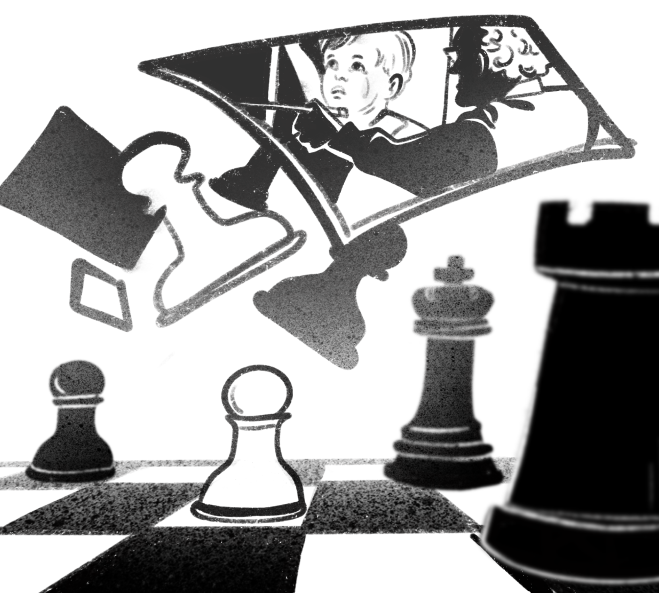
The Wingless stopped short under the Old Man’s stern gaze. The Old Man slowly shook his head, then slowly began to move his fingers. Despite the fact that the air in the old bar was already stale from alcohol and cigarettes, for a second the Angel in black clothes felt like he had nothing to breathe at all: so severe the pause was.
‘I expected that,’ feeling regret, the Elder whispered to the Wingless so expressively that the former Angel even had to cover his ears with his hands. ‘You know that children are a prohibited move.’
The Elder’s voice rolled like a wave through the small room of the cafe, echoed off the walls and, returning back, created a powerful vibration of the air that raised the chess table and chess pieces up, only to put them back down with a crash. The former Angel steadfastly watched this from the side, he knew that the Elder would have exactly this reaction to children.
‘I know,’ the Wingless answered calmly when the tornado caused by the Elder’s voice stopped. ‘But almost everyone you take such great care of uses this forbidden move. Wake up!’
The Angel looked at the Elder, how offended he was for this kind Old Man! How desperately he wanted the Old Man to finally admit that people are most often driven not by virtue, but by greed and evil.
But seeing the Old Man’s face become imperturbable again, the Angel spoke even faster:
‘And so the artist began to implement his plan, he began to draw children. He found the dirtiest, most disgusting boys for his embodiment and drew them at the moment of the most extreme childish emotions. “I will show you who you love!” the artist shouted, drawing a portrait of another boy. “I will show you their true faces!” he roared, starting on another portrait.’
‘But people saw something completely different in those portraits,’ the Old Man interrupted the Wingless bitterly and dropped another light chess piece onto the chessboard with a crash.
The Angel approached the chessboard and frowned: he did not want to lose this game at all.
‘The artist shouted, “Then I will make all these children cry!” What is beautiful about that?’ The angel broke through the defence of the light chess pieces with a dark one. ‘The artist painted deliberately artificial tears on each of those unbearable boys in the portraits.’
The Elder looked away from the chess game for a second and looked closely at the former Angel. Without taking his eyes off the Angel’s cold eyes, the Elder placed the light piece on the chessboard.
‘People loved those boys. Although the artist had a bad goal, in the end it turned out to be good.’ The Elder removed the black queen from the table. ‘The artist was truly talented, he knew how to paint eyes full of pain and despair, eyes that lived, that wanted to live. People saw those poor tearful kids and everyone dreamed of taking at least one of the artist’s canvases home. Although those boys had fake tears, people cried real tears from those paintings! Tears of those boys!’
The Elder carefully put aside the black chess pieces beaten by the white ones. They were immediately picked up by the Wingless and he burst out laughing right in the Elder’s face.
‘Well, let them cry for real then!’ he ordered loudly and threw his white trophies straight into the fireplace. The fire from the fireplace growled gratefully and began to slowly digest the small ivory chess pieces with its fiery mouth.
‘Let all your light ones cry,’ the Angel repeated once again right into the Elder’s ear. ‘The first couple who bought the painting of the crying boy had their house burn down.’
‘It happens,’ the Elder answered calmly. ‘Fires really did happen at that time.’
The Fallen shook his head.
‘The second couple’s house also burned down. And then your precious artist’s studio burned down too,’ the Wingless snapped his fingers contentedly and for some reason looked under the chess table.
The Elder also looked under the table, and then picked up the light rook.
‘But you’re not telling the truth,’ he said condemningly. ‘The artist himself set his studio on fire. Or was it you?’
The Wingless narrowed his eyes slyly.
‘He set it on fire himself,’ he stated categorically. ‘The artist learned about the fires, and then, around the same time, Ray Bradbury published that very story “Fahrenheit 451,” where everything burned with a blue flame. Only everything was supposed to burn not in Fahrenheit, but in Celsius, and the artist proved it.’
The Fallen glanced at the remaining pieces on the chessboard and yawned.
‘Fires were indeed not uncommon at that time,’ he stated conciliatorily. ‘Only people and the firefighters themselves were alarmed by the fact that in every ashes they found paintings with those same crying boys. Sleight of hand and so, people started a riot, it seemed to them that the living, tearful eyes of the boys were looking from the paintings with reproach and were taking revenge on them for something. People began to sound the alarm, turning to local police stations and local newspapers with a request to protect them. And what did your light ones do, huh? Tell me.’
The Elder looked again at the fireplace where the remains of the light chess pieces were burning out.
‘They collected all the paintings along with their reproductions, took them to the square and gave them a real hell. People threw the artist’s works into a big fire, and The Sun newspaper covered this event,’ the Wingless said loudly. ‘And that’s it, people never remembered the name of this artist again, his paintings are not in any gallery, no one has ever made a film based on his story. That’s it, the mantle has been thrown off the king of the whites!’
The Fallen laughed loudly, this game was definitely his. But the Elder was still sitting in his comfortable chair and said nothing. Silence was hanging in the bar, occasionally interrupted by the measured ticking of the old clock and the quiet crackling of the antique fireplace. It seemed that time had stopped and this story was over.
The old man looked at the chessboard carefully.
‘You know,’ he began thoughtfully, ‘all those boys in the paintings were outcasts. It’s very painful and scary to be an outcast, I don’t need to tell you, do I?’
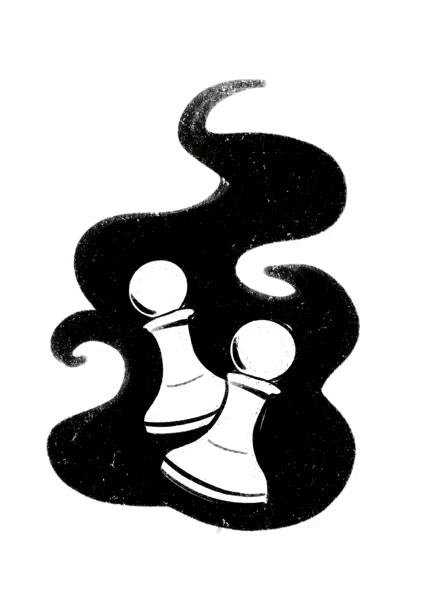
The Wingless lowered his eyes.
‘The outcasts,’ the Old Man repeated, ‘those who are never noticed by anyone, children without childhood and, most likely, without youth. Children about whom cigarettes are put out, children on whom drunken innkeepers take out their anger, children who are eaten alive by lice. Without a clear present and any precise future. However, the artist gave all those children the right to eternal life, could they have dreamed of such a thing? And did all those children even exist?’
The Angel looked at the Old Man in amazement.
‘These paintings are still alive because compassion is still alive in people, and only those who are not afraid to admit their dark side can look at them calmly,’ the Elder slowly moved the white king piece to the black side of the chessboard.
‘I created this artist, I created this world, and you always played along with me,’ the Elder said calmly. ‘But as long as there is compassion in people, the boys from those paintings will live. Checkmate.’
The Wingless silently sank into his place, it was still hard for him to believe what was happening. The Elder approached him and patted him on the shoulder in a friendly manner.
‘It is hard to be an outcast, I know,’ he said quietly, looking into the eyes of the astonished Angel.
The Angel slowly stood up from the chess table.
‘But it is much worse to be unforgiven, Father.’

Chapter Two
The Flap of a Butterfly’s Wing and the Philosopher’s Stone
‘I’m so bored,’ a young lady said sadly, looking at the people from a high tower.
‘And I’m bored too,’ another lady said fatefully, looking at the people from the other side of the tower roof.
‘Well, where are they rushing to?’ their third friend shouted. ‘Hey, Reveller, you shouldn’t have lost your basket, the cabby’s horse is about to crush it!’
The enchanted ladies found themselves at the edge of the tower in the blink of an eye, next to their friend, and looked down. The young maidens saw how a confused passerby barely managed to jump back to avoid being run over by the confident gait of a strong, venerable horse. The horse, seeing the passerby, reared up, overturned the cart and desperately ran forward, pushing aside everything that came its way.
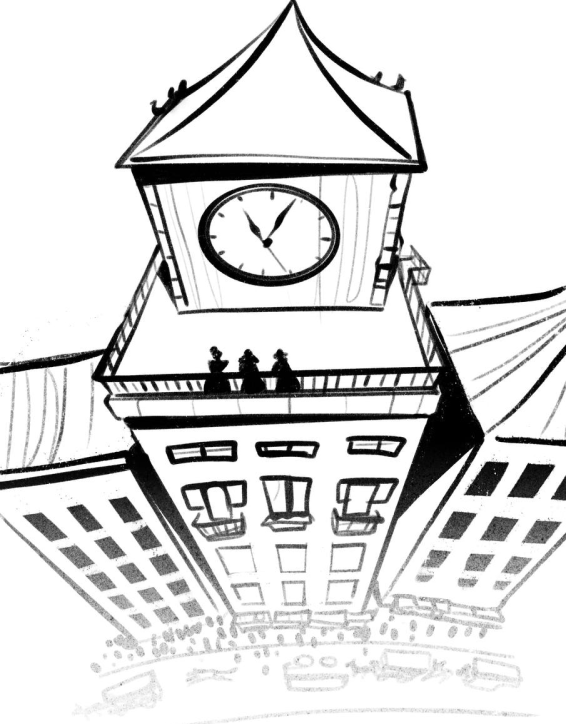
The driver of the cart cursed and fell right into the fresh fish that the local fishermen’s wives were selling. The women screamed in fear, some of them even shamefully covered their faces with the dirty hem of their aprons, and the local punks began to squeal joyfully and stuff the fish that were left unattended into their pockets.
The driver cursed again, then, periodically slipping and awkwardly rubbing his sides, tried to put two freshly caught fish into his pocket. But he was immediately caught red-handed by the local gendarme, who had been calling on the people who had witnessed this comical street situation to remain calm.
Two elderly ladies passing by the raging people were so absorbed in watching the commotion that they did not notice a drunken innkeeper lying at their feet, who, taking advantage of the temporary chaos, was crawling along the broken sidewalk in search of change.
One of these noble ladies tripped over the clumsy body of the drunk man and, having made a dangerous somersault in the air, fell onto the cart, which was overturned by the horse. A crush began, someone from the crowd extended a hand to the lady, someone, on the contrary, tried to tear a piece of expensive material from her dress. The local inquisition immediately arrived at the lady lying on the cart, and began to read prayers in different voices. A disgruntled cat crawled out of the overturned cart and masterfully climbed onto the back of one of the inquisitors, causing him to forget all the prayers and run. The chaos wouldn’t subside, and the lively cries of the crowd were joined by the crying of babies and the wild howling of dogs that appeared out of nowhere.
The ladies, who were watching everything that was happening from the roof of the high tower, sadly shrugged their shoulders.
‘But all this could have been avoided, if this idle reveller had been able to bypass time,’ the First Girl said dreamily, moving away from the edge of the roof.
‘If he knew at least something about the structure of the Universe, he would be able to control the secret forces of matter and extract crystals from chaos himself,’ the Second Lady agreed with her friend.
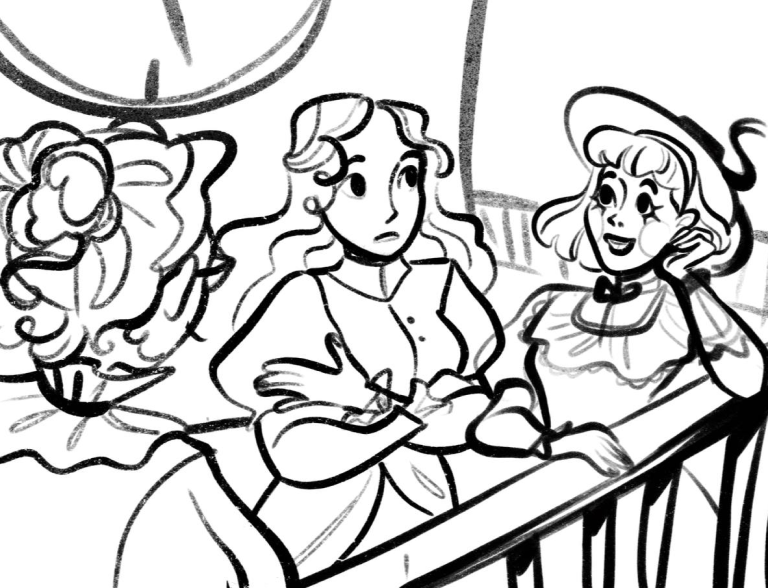
‘Well, at least he definitely would not have gotten into a stupid situation,’ the Third Young Girl said, shaking off her dress.
She looked around and motioned for her friends to come to her:
‘When I see something like this, I always have a question: Why don’t we do something for people, like…..’
‘A spell?’ the Second asked fervently.
‘A spell is also possible,’ the Third continued in a conspiratorial tone. ‘Something that would bring people closer to the real, not the fictional, structure of the world. Something that would allow them to always change any situation in the direction they need.’
‘You are unlikely to change the reveller,’ the First friend rightly noted. ‘In such cases even an ipecac is powerless, but to figure out how to give people secret knowledge, that is exactly what you and I will do now.’
The girls looked down from the roof of the tall building for the last time and slowly began to descend the spiral staircase.
‘So, what will help us,’ inspired by the creation of something unusual, the First girl began to speak. ‘A rabbit’s foot has an effect… No, that’s not it… A stone thrown into water… No, that’s not it either…’
‘What are you muttering there?’ the Second friend asked discontentedly. ‘We have already arrived.’
‘Oh, look, a butterfly,’ the Third Girl exclaimed in surprise.
The three friends stopped in front of a heavy wooden door, behind which the entrance to the secret room of all three girls was hidden. The heaviest oak door was indeed decorated with a multi-coloured butterfly, which lowered and then raised its wings, as if calling the girls to come inside.
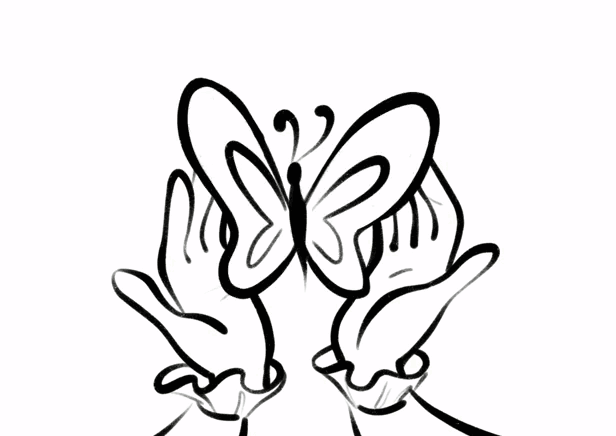
‘I got it!’ one of the girls threw up her hands. ‘This is what we will take as fundamental knowledge: The flap of a butterfly’s wing on one end of the globe can cause a hurricane on the other.’
After this phrase, the three friends entered the room. The room was a library with numerous tiers and intricate passages. All the walls in the room were lined from top to bottom with shelves with books in multi-coloured covers. In the corner of the room, the girls always had a small fire burning, on which some liquid was constantly boiling in an iron cauldron.
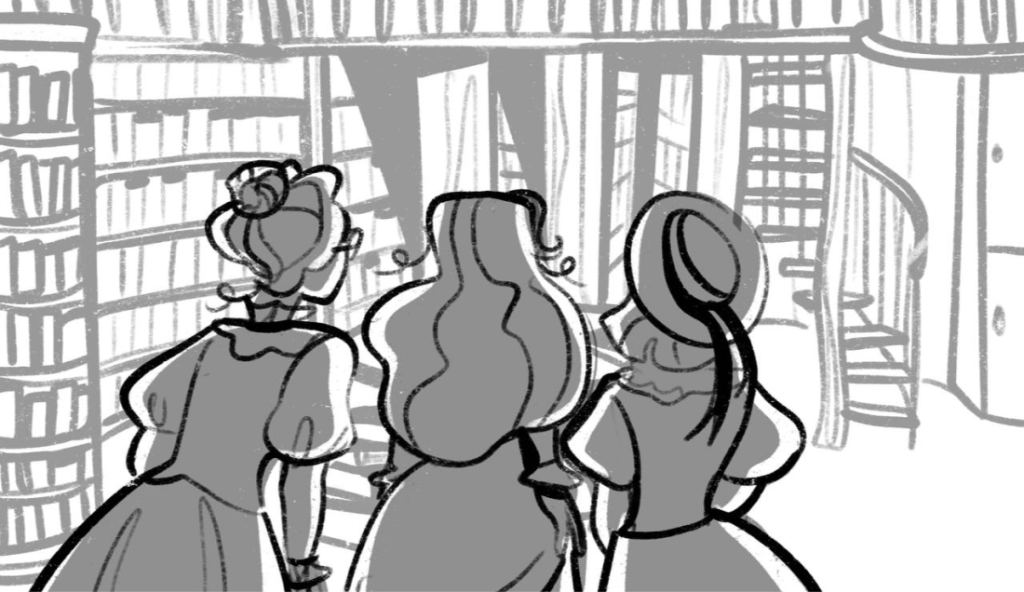
The girls decided to gather around a round oak table, on which sheets of paper were neatly laid out, sprinkled with rose petals on top.
‘Sit down!’ the First Girl commanded in a businesslike manner as soon as all her friends entered the room. ‘Our task is to teach people to bypass time and avoid a series of random events. What’s more, you and I are practically searching for a “theory of everything” right now. What can help us?’
‘Science,’ the Second Girl answered her confidently and reached for a book on the shelf. ‘We know that everything in the world is a geometric figure, here,’ the Girl began to show her friends pages from the book.
‘We also know that light focused at one point can cut metal,’ the third participant in the conversation willingly joined in. ‘We know that it is easy to penetrate the structure of any matter, getting to its atoms.’
The First Girl nodded in agreement.
‘And we also know that any matter has a mirror image – the same matter, with the same mass and the same momentum, which differs from the main matter only in its electric and colour charge, and its quantum number.’
At the word “quantum”, all the girls put their hands on their chests and nodded at the same time.
‘That is, there is something original,’ having paid respect to the quantum world, the First Girl spoke again. ‘And this something has almost its complete antipode – a twin with the same set of chromosomes, but with a completely different sparkle in the eyes. Matter and antimatter. So, if these 2 twins – matter and antimatter, ever meet, they will mutually destroy each other, but at the same time, each of them will release energy.’
‘How beautiful,’ the second girl said, dreamily rolling her eyes. ‘As if the dark and light forces collided with each other, and because of this we saw the electric charge of lightning……. Beauty……’
‘Stop!’ The first girl stopped her friend decisively. ‘Repeat what have you just said?’
The young lady number two dropped the book she had just been holding in her hands in surprise.
‘I was talking about the sky, the dark and light forces…’ she repeated timidly.
‘No way!’ the third participant in the conversation exclaimed in amazement and began to look for something on the shelf with books. ‘Here! This is actually the real “spell of destruction”!’
The friends looked closely at the yellowed pages of the ancient book. There, in ancient ink that had eaten into the layers of thick parchment over time, was written “Spell of destruction: Mirror objects can coexist in harmony, like yin and yang, but their meeting with each other will destroy everything that exists.”

‘Do you understand that this is no longer funny?’ the first friend addressed the girls again. ‘If we teach people to work with matter at the level of elementary particles, then they will be able to transform one substance into another. For example, we know that one small particle of something can be in different states at the same time, ready to jump up in the middle of the night and fly straight into space and at the same time be in a state of complete rest. We also know that each such particle has a twin particle, which this particle can influence at absolutely any distance.’
‘Amazing!’ exclaimed the third girl and ran around the table. ‘How do you like it?’
The friends looked at the old book again. This time it said: “Solve et Coagula” – divide and unite.
‘The essence of this process is the decomposition of matter into elements for their subsequent transformation into a more perfect state. “The division spell” is suitable for obtaining a completely new substance from one substance, and is suitable for separating the old and unnecessary from the new and clean.’
‘There goes the science,’ the third girl grinned. ‘How many times have they said that you need to get off the “dead horse”, because it will not go anywhere anyway. But someone apparently just needs to believe that changes happen on their own.’
‘The main thing here is to see in time that the horse is dead,’ the first girl objected to her.
‘Here you need to learn to look correctly,’ the third friend said with the same intonation. ‘Science has long discovered that at the subatomic level, at the level of objects that are many times smaller than atoms, the world behaves far from the way we are used to observing in the macrocosm. Heisenberg’s uncertainty principle and the wave nature of particles challenge the classical notion that reality is clearly defined and stable. We see the world only through our own prism and are afraid to go beyond the system of limiting beliefs, while Heisenberg proved that the world is determined not by certainties, but by probabilities. And the closer we get to a particle that we want to hold on to, measure, and send according to our own scenario, the faster the particle will change its direction.’
The girls fell silent.
‘That is, if we begin to study someone deeply, instead of simply admiring them or doing some joint actions…’ the second girl began to say, but quickly stopped herself. ‘We’ve been behaving incorrectly all our lives.’
The friends fell silent sympathetically. They wanted to somehow divert their friend away from thoughts on the topic of love experiences.
‘By the way,’ the first girl broke the silence. ‘If we take as a basis that the world is determined by probabilities, then in principle there are no concepts of good and evil.’
‘But there is another spell,’ the third friend happily supported the girl. ‘Visita Interiora Terrae, Rectificando Invenies Occultum Lapidem or “VITRIOL”, which means “Having accepted everything as it is, you will find the philosopher’s stone”. But not just a stone, but a real key to understanding the unity of the Universe. After all, if two objects that are closely interconnected or entangled have the ability to instantly influence each other, then the entire Universe is a single whole, in which a change in the sequence of some events leads to a change in the sequence of other events.’
‘That is, if one of us does something wrong…’ the second girl cautiously suggested.
‘But you can do something right,’ the third girl answered. ‘You can even just swap things around, and everything will change. I wonder what mathematicians would say about that?’
‘Mathematicians would suggest looking for logic in chaos,’ the first friend responded happily and began to draw lines on the floor.
The girls began to watch with interest as strange drawings emerged from under the girl’s hand.
‘Geometry!’ the girl said, having finished drawing. ‘Spatial structures and their meanings.’
‘And how will these cubes help organise chaos?’ the third friend asked skeptically.
‘Everything that exists in our lives has a certain form, you could even say that geometry is a codified language that explains groups of geometric shapes that can be found in different places. For example, everything is in the form of a circle.’
‘Wait, wait,’ the second girl interrupted her friend’s story. ‘There is nothing in the circle at all, it is empty.’
‘Exactly! There is empty space. The space in which absolutely everything is, because it is empty space that is capable of containing everything that exists. How can you count empty space? You can’t, because it is zero. A simple and all-encompassing zero.’
The first girl erased everything she had previously drawn on the floor with her little foot and began to draw new figures.
‘What is this?’ the second and third girls asked in unison.
‘Metatron’s Cube!’ their friend solemnly announced.
A bulky three-dimensional figure was drawn on the floor, which consisted of 13 spheres connected by lines. There were also polyhedra, distinguished by a high degree of symmetry, the so-called Platonic solids.
‘This is how geometry denotes harmony. Metatron’s Cube has all the shapes that exist in the Universe, whether your gaze catches on them or not.’
All the girls looked closely at the drawing on the floor.
‘It’s still unclear how these lines will help organise chaos,’ asked the third girl and tried to run her hand along all the lines of the mysterious figure.
‘Both chaos and harmony originate from one point and converge in it,’ the first girl tapped her finger on the middle of the cube. ‘All the elements, all peace originate in one single point, as does the whole world. Even this figure itself looks like some kind of set of lines, but if you look at it for a long time, you can see quite a clear logic in it. Even if we stand in a circle and start dancing around Metatron’s Cube, it will remain unchanged. That’s where its strength lies, in its absolute symmetry relative to everything. The truth is always one, everything else is just speculation and interpretation.’
All three girls actually joined hands and started spinning.
‘I remembered! I remembered!’ the third girl suddenly screamed loudly. ‘Of course!’
The girls stopped abruptly and for some reason looked at the cauldron with the brew. But it continued to hum rhythmically, digesting some kind of viscous liquid.
The third girl left the circle and abruptly ran up to the second tier of the library, and then returned to her friends with the book just as quickly.
‘Chaos Theory and Order in Nature,’ she opened the book and began to read loudly. ‘Chaos Theory in physics describes how the most complex systems can behave unpredictably, while obeying certain laws. In such systems, even small changes can lead to big consequences. Remember the butterfly on our door?’
‘A butterfly’s wing flap on one end of the globe can cause a hurricane on the other,’ the second girl recalled the butterfly’s appearance with surprise.
‘True,’ the third girl nodded, and then continued. ‘However, from chaos, “fractal structures” – or ordered forms – can arise, that is, nature creates ordered structures from random processes.’
The girl slammed the book shut on this phrase and went to the shelf that hung above the cauldron. This was the only shelf in the girls’ home that was not filled with books. On it you could find all sorts of jars in which various bulk elements were stored.
‘If we take a regular salt solution,’ the girl quickly began pouring salt into a container with water, ‘And then just leave it in this container for a few days, the water will evaporate, and the salt will begin to form crystals. That is, the molecules that were moving chaotically in the solution will find their stable state in the chaos that is unusual for them and will unite into a crystal lattice. We will see the process of forming order from disorder. What does this mean?’
The friends exchanged glances.
‘That gold can be obtained from any metal?’ the second girl ventured to suggest.
‘That there is no need to fight chaos,’ the third friend confidently answered. ‘Chaos, not order, is precisely our natural state. It is chaos that helps us live, develop and evolve. Uncertainty and mystery. And everything we talked about earlier is further proof of this: the Heisenberg uncertainty principle, mirror twins, chaotic lines that lead to one point, and the annihilation process – when a particle and its antiparticle meet, are destroyed and release energy in the form of light particles – photons. By the way, this mechanism is actively used in particle accelerators, where particles collide at high speeds, creating new particles that can be studied: an example is the famous Einstein equation E = mc2, which shows that energy and mass are interconnected, and energy can be transformed into matter or particles. And even the process of transmutation, when any metal turns into gold.’
‘And even time,’ the first friend modestly said, taking advantage of the break that her friend decided to take.
‘And even time,’ the third girl nodded gratefully. ‘In quantum physics there is an idea of “time crystals”, which are hypothetical structures that periodically repeat not only in space, but also in time. This is a special form of matter that preserves its structure in any dynamic state. In such matters, any random deviation, again, leads to order.’
‘What does it mean? It means that we are all these very pieces of light that carry energy, we are all ordinary excited states of quantum fields, we are all photons – ordinary disturbances of electromagnetic fields. And then, it turns out absolutely definitely that if we flap our wing on one part of the world, we will cause a hurricane on another,’ the second girl said in amazement and looked at her friends.
Reflecting on their discovery, the friends did not notice how the first girl had been rustling some sheets of paper all this time, that were more like a newspaper.
The girls looked at the strange bundle of crumpled sheets of paper in surprise, and the first girl carefully straightened the bundle with her small hands and read.
‘In ri sol! – This phrase is found in many ancient spells,’ the girl said, looking at the sheets of paper. ‘I have heard this phrase many times, but I could not understand why it is interpreted as connected with the solar image and the knowledge of truth. And now I understand.’
The two friends froze in impatience.
‘Ancient people knew very well about the properties of matter, they knew that there are some substances, by colliding which you can get the most powerful new clot of energy, a bright flash. And they thought that this flash was the manifestation of the Sun, but it was, in fact, a photon!’
All three girls fell silent. Now magic no longer seemed so unscientific to them, and science, on the contrary, seemed even more mysterious.
The silence that had formed was broken by the first girl, who quickly began to fold the sheets of paper and collect everything that the young, lovely muses had scattered on the table in their rush to find the truth.
‘Well, that’s it,’ she commanded. ‘We must immediately put all our knowledge into the cauldron, lift it to the top of the tower and pour all this knowledge onto people. I hope that we will never see such a picture with an overturned cart again. Help me!’
The second girl threw up her hands and rushed to the cauldron, which had already heated up to the required temperature and was boiling in anticipation of adding new discoveries to it.
Only the third girl remained standing.
‘Don’t do it! she said loudly. ‘Don’t.’
The girls turned around in surprise.

‘Don’t do what?’ the second girl asked discontentedly.
‘Don’t pour knowledge onto people,’ the third friend answered.
The first girl, taken aback, almost dropped the cauldron.
‘Why?’
‘Because people need to believe, they don’t always need to “know.” Judge for yourself, people are always trying to get confused with someone and believe that they are confused. Do they need to understand that entanglement occurs at all levels simultaneously – at the level of atoms and at the level of molecules. And only then would that very telepathy be possible – the transmission of quantum information between particles over long distances. What would happen if people learned that it is possible to create materials with predetermined properties at the atomic level and began to control it? In what world of matter would we then live? What would happen if all people learned about the existence of field theory and began to endlessly catch particles of matter and excite them? After all, we have already accepted the truth that the flap of a butterfly’s wing on one end of the world can cause a hurricane on the other. And what would happen if all chaos disappeared from people’s lives?’
The girls moved away from the cauldron, the idea of their third friend seemed more than reasonable to them.
‘What do you suggest?’ they uttered in unison.
‘Encrypting all this knowledge and hide it so that only those who are ready for it can find this science.’
_____________
‘So what did they do as a result, Father? Did they pour knowledge from the cauldron onto people or not?’ the Wingless Angel asked the Elder.
‘Nothing, they are still arguing,’ the Elder answered, smiling. ‘While they were arguing, a science called “alchemy” appeared and disappeared, which tried to bring people closer to knowledge through spells and the search for the philosopher’s stone. Spells were actually laws clothed in a mystical form, the philosopher’s stone was a crystal of time…. But people began to use this knowledge to turn metals into gold. And then they decided that alchemy was a pre-science about toads, frog legs and witchcraft potions.’
The Wingless Angel looked down at the people from a high tower.
‘It turns out that people were looking for gold in substances….’ he said thoughtfully.
‘And scientists found it in themselves,’ the Elder answered.
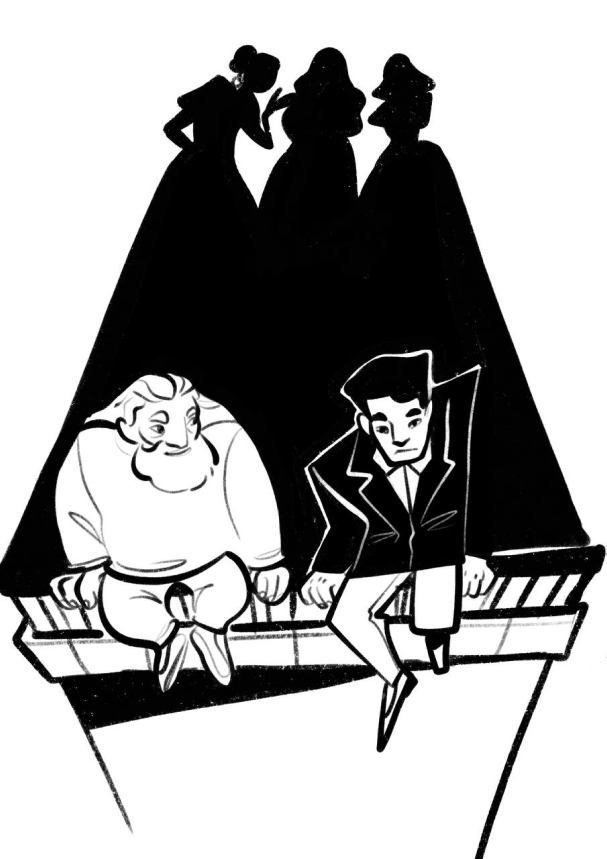
Chapter Three
The Fifth Season and the Population Explosion of Elementary Particles
Unhappy with the outcome of the chess game, the Wingless Angel sat down at the piano, which was left by the mysteriously disappeared owner of the old mansion. The Angel began to play melodies, to which all the objects in the room began to come to life, for some reason the window sash slammed, throwing it wide open, and an icy wind flew into the bar along with withered leaves.
The Angel tore himself away from the piano and turned to the Creator.
‘Look how the keys obey me. I touch the keys, the hammer, which is located behind the key, hits the string and a sound is heard. And I can play any piece of music. Just like you,’ the Angel turned his palm and made a glissando on the keyboard. ‘What if the world has the same structure as a piano and when people make a decision, then everything that exists moves along the strings of the Universe, even you and me?’
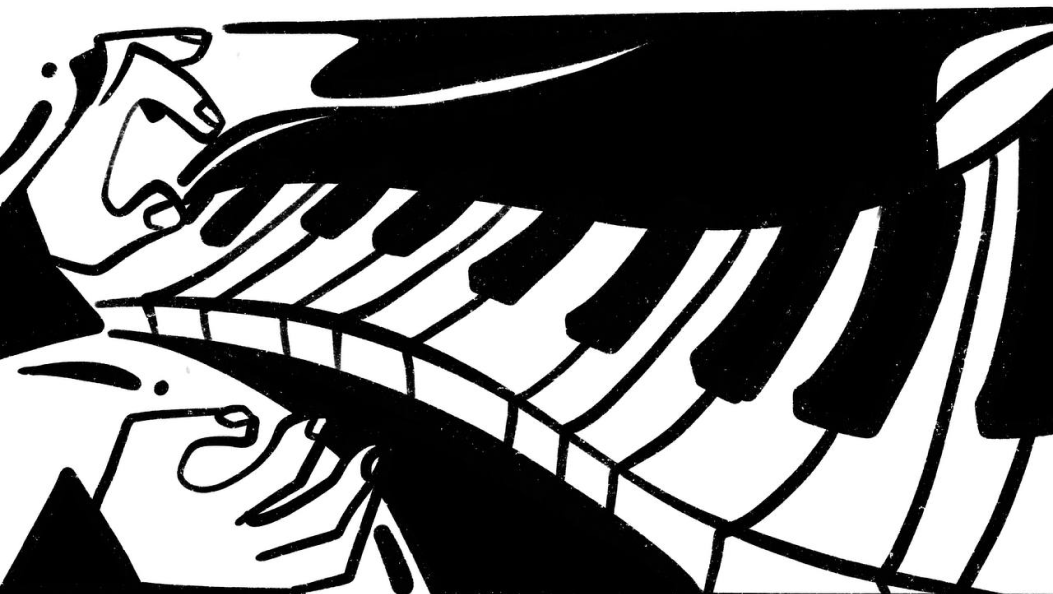
The Angel approached the open lid of the piano and looked inside. 230 strings were looking at him from the piano, glittering.
‘But there is something in this…’ the Elder responded thoughtfully and began to remember. ‘Once, it seemed to scientists that nothing more could be invented and that the Universe was an absolutely predictable and well-tuned machine. However, in the clear and understandable sky of science, one incomprehensible white cloud remained.’
The Elder slowly approached the open window, behind which a dark, endless distance stretched. The wind stopped, and somewhere in the distance the faint lights of foresters who had gone out to hunt could barely be seen.
‘It turned out that in opposition to the light matter, there is exactly the same large dark body. So this body completely absorbs the radiation falling on it, regardless of anything. It’s like talking to emptiness.’
The Wingless Angel went to the window and stood next to the Creator.
‘But this is absurd,’ thinking that the Old Man had completely lost his mind, he said. ‘Dark matter is light matter, like you and me… But even if you talk to me, and I remain silent, the sound will still be reflected from objects, and even from me. Just like light. Nothing can completely absorb light.’
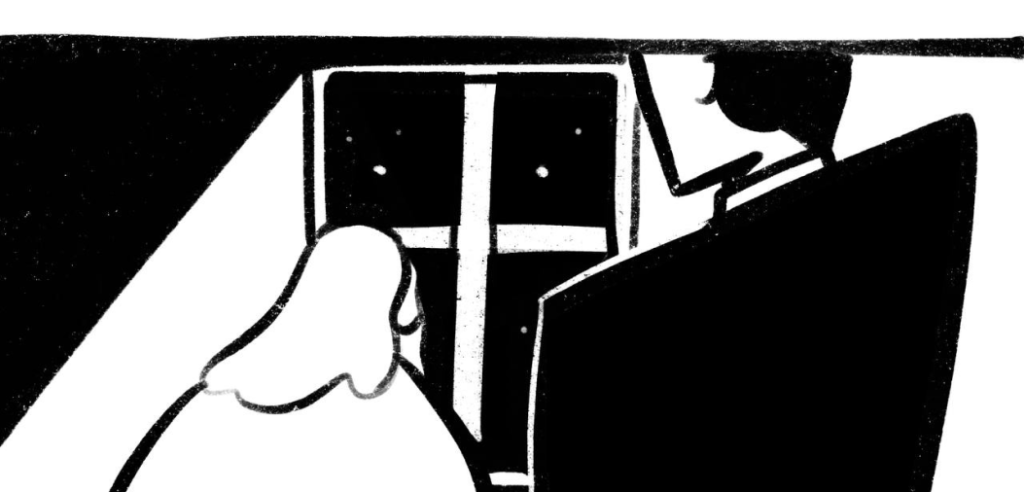
The Old Man smiled and the Angel involuntarily admired the wrinkles around his eyes.
‘Of course, it all sounds like some kind of nonsense,’ the Elder smiled even more. ‘To get away from such obvious nonsense, the German scientist Max Planck suggested in 1900 that visible light, X-rays and other electromagnetic waves can only be emitted by some very small, or, as they are also called, “discrete”, portions of energy, which he called quanta. With the help of quantum particles, it was possible to solve the contradictory nature of an absolutely black body.’
‘And you call it a mystery of dark matter?’ the Wingless said lazily. ‘If only everything were so simple.’
The Elder smiled mysteriously again:
‘And here you are absolutely right,’ he praised his Wingless companion. ‘Quanta really explained a lot, but neither they nor Max Planck could take into account the appetite of this unpredictable hypothetical matter. At first, it began to absorb everything without complaint, then small flashes were really enough for it, then it began to absorb everything again: both flashes and rays and everyone who directed these rays, and then it simply disappeared to appear again.’
‘So, is the existence of such a matter one big uncertainty?’ the Angel asked with undisguised interest.
‘This is exactly how the Heisenberg uncertainty principle was discovered. Its essence boils down to the fact that, contrary to all claims, nature limits the ability of all creatures to predict the future based on physical laws. Because it is unknown when the all-consuming matter will suddenly want to go on a diet, and it is unknown how these small pieces of light will behave. It turned out that they behave completely differently from any other things in the macrocosm around us.’

The old man smoothly moved to the piano and beckoned to the Angel with his hand.
‘You played a melody, and everyone who heard it obeyed your music,’ the Elder put his thumb on the F-sharp key. ‘But it turned out that there are very small particles in this world that did not want to obey. The world of such tiny particles is so turbulent and incomprehensible that it contradicts common sense. Space and time in it are so distorted and intertwined that there are no ordinary concepts of left and right, up and down, dark and light, and even the “before and after” concept.’
The angel glanced around the small room of the old cafe. He still did not believe that there were some particles that even he could not see with all the spheres of his vision.
‘There is no way to say for sure at what point in space this or that particle is at a given moment, and what is the moment of its impulse, its intentions. They are as if “smeared” across space. There is only a certain probability of finding a particle in many areas of space and time. Moreover, the “status” of the particles themselves is not defined: in some cases they behave like waves, in others they exhibit the properties of particles. This is what physicists call the wave-corpuscular duality of quantum mechanics.’
The Wingless thought about it. He did not like at all that something had appeared that could not be controlled. But the thought that the Elder also could not control the protesting particles briefly delighted him.
However, the Elder continued.
‘But in the general theory of relativity, as in a state with opposite laws, the situation is fundamentally different. Space there seems to be similar to a trampoline – a smooth fabric that can be bent and stretched at will by objects with mass. They create deformations of space and time, which all earthly creatures feel as gravity. Do I need to mention that the orderly, correct and predictable General Theory of Relativity is in an insoluble conflict with the “eccentric hooligan” – quantum mechanics?’
The Wingless looked at the black and white keys of the piano with delight.
‘And, as a consequence, the macrocosm cannot “make peace” with the microcosm!’
The Angel joyfully began to play Mozart’s “Suite in C major”.
The Elder came up to him from behind and again, in a fatherly manner, put both hands on his shoulder.
‘This is where string theory comes to the rescue.’
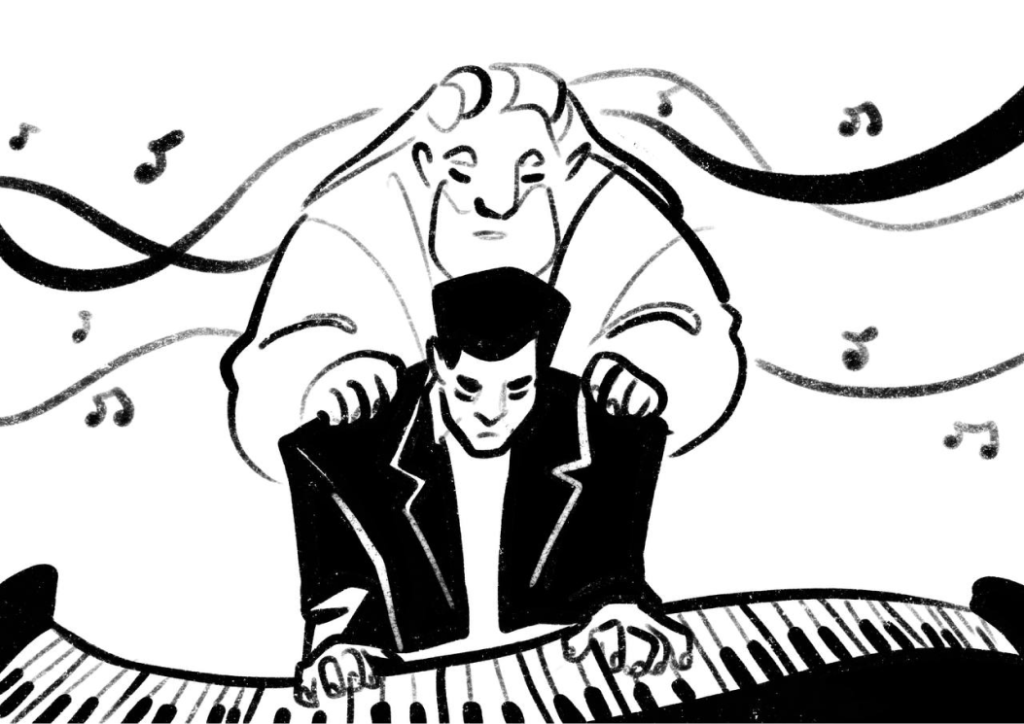
The Angel slammed the lid of the piano after such a surprise. How tired he was of these surprises from the Universe, which the Elder constantly threw at him.
The old man put the piano lid back in place and began to remember again.
‘Once upon a time, scientists put forward the hypothesis that all the exquisite dances of galaxies and the mad dance of the smallest particles can ultimately be explained by just one fundamental physical principle. Maybe even a single law that unites all types of energy, particles and interactions in some elegant formula. It is logical: General Relativity describes one of the most famous forces in the Universe – gravity. Quantum mechanics describes three other forces: strong nuclear interaction, which glues protons and neutrons together in atoms, electromagnetism and weak interaction, which is involved in radioactive decay. Any event in the universe, from the ionization of an atom to the birth of a star, is described by the interactions of matter through these four forces.
Using complex mathematics, scientists managed to show that electromagnetic and weak interactions have a common nature, combining them into a single electroweak interaction. Later, strong nuclear interactions were added to them… But gravity did not join them at all. It was as if autumn did not want to join the four seasons.’
‘It is merciless of it,’ the Wingless stated wearily. ‘It all resembles one big fairy tale.’
‘The emergence of string theory is just like a fairy tale,’ the Elder continued his story. ‘In the late 1960s, a young Italian theoretical physicist Gabriele Veneziano was looking for equations that could explain strong nuclear interactions – an extremely powerful “glue” that holds atomic nuclei together, binding protons and neutrons together. According to the legend, the physicist accidentally stumbled upon a dusty book on the history of mathematics, in which he found a two-hundred-year-old function, first written down by the Swiss mathematician Leonard Euler. Imagine Veneziano’s surprise when he discovered that the Euler function, long considered nothing more than a mathematical error, described this strong interaction.’
The angel yawned tiredly and looked at the clock frozen at 22:12.
‘Eventually, the formula caught the eye of a young American theoretical physicist, Leonard Susskind, who saw that the formula primarily described particles that had no internal structure and could vibrate. And then Susskind realised that the formula described a thread that was like an elastic band: it could not only stretch and contract, but also oscillate and even wriggle. Having described his discovery, Susskind presented the revolutionary idea of strings.’
The Elder played a festive march on the piano, which made the frozen clock on the wall start to work again.
‘It was a real “population explosion” of elementary particles!’ the Elder sang to the music. ‘Physics graduate students ran along the corridors shouting that they had discovered a new particle! But, alas, in the “maternity hospital” of new particles, the scientists were still unable to find the answer to the question…’
‘Why are there so many of them and where do they come from?’ the Wingless finished instead of the Elder.
It seemed that the Angel began to understand what was bothering the physicists, but this only increased the number of questions. The Wingless looked at the piano strings again, wanting to find the answer there, but the Elder’s voice came from there.
‘This prompted the physicists to an unusual and amazing discovery that there are particles of matter and along with them there are carrier particles that carry interactions. The example is a photon – a particle of light. The more of these carrier particles, the brighter the light. However, gravity still did not want to fit into the framework of any of the proposed theories. Moreover, unexpectedly discovered particles, such as tachyon, were generally beyond the understanding of scientists: in order to see them, you needed the sharpest eye. Over time, the American physicist John Schwartz supplemented the string theory with the discovery of a new particle – the graviton, which would allow gravity to be transferred to the quantum level.’
‘And which is also impossible to see,’ the Wingless muttered maliciously.
He wanted to give a passionate speech about how physicists are ruining everything again, about how they themselves invented the existence of some kind of dark matter, hastily concocted a string theory that defied all logic in order to unite all the forces of the material and immaterial worlds, and that now physicists themselves do not know what to do with it. But, looking at the fireplace, the Wingless stopped short.
A man stood calmly near the fireplace and watched with interest the lively conversation between the impeccable Elder and his demonically attractive friend.
This meeting was so unexpected for the former Angel that he, without saying a word, motionlessly looked at the imperturbable figure.
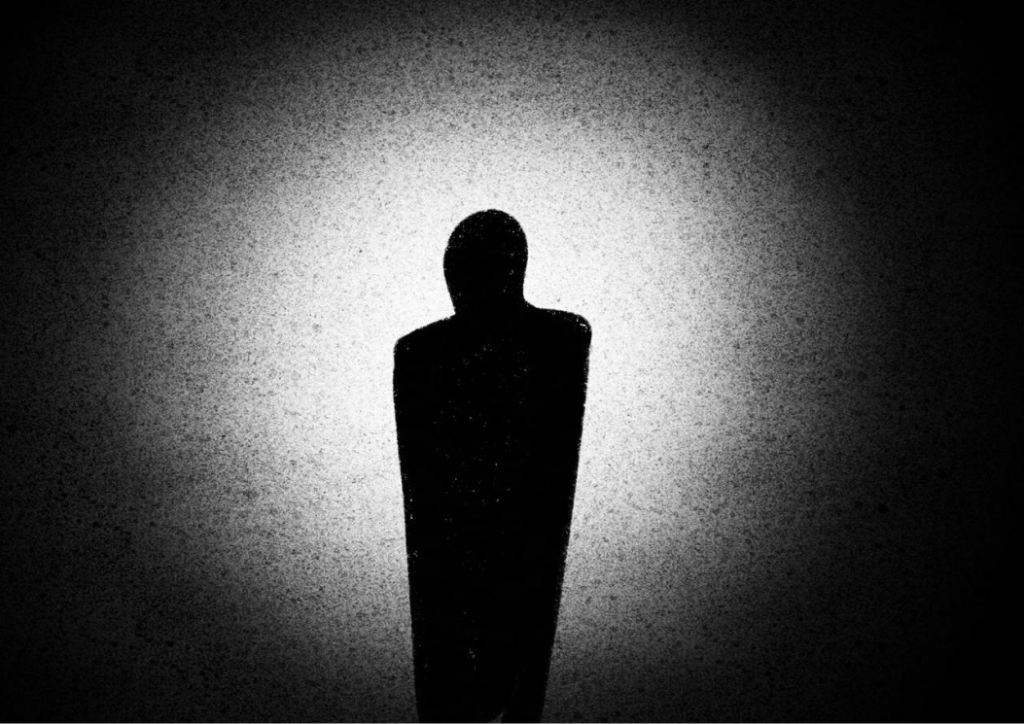
However, a couple of moments later the figure disappeared, and a moment later the Elder and the Angel heard the sounds of music: the same man in the old gray suit, who had been standing near the fireplace just a few moments ago, was playing the piano.
‘The scientists were just looking in the wrong place. Something else is needed to prove string theory. Something that sounds like science fiction,’ the figure said intriguingly to the sounds of a waltz. ‘The existence of additional dimensions of space requires confirmation.’
While the wise Elder and the Wingless Angel tried to believe what was happening and what they had heard, the stranger stopped playing the waltz and switched to a mazurka.
‘Wow, this piano is already 100 years old, and it sounds as if only yesterday the Angels played it during the Big Bang.’
The figure of the stranger looked happily at the Old Man and bowed gratefully to the Wingless Angel. Then it went to the portrait on the wall and wiped the dust off it with the sleeve of the suit.
‘Einstein showed that gravity is nothing more than a deformation of the dimensions of space and time, but electromagnetism can also be a ripple. And we do not see it because it exists in an additional, hidden dimension. And this fifth dimension is curled up billions of times stronger than the size of a single atom, which is why we cannot see it. The idea of the existence of this tiny dimension, which is all around us, is the basis of string theory.’
The Old Man nodded his head approvingly.
The Wingless Angel wanted to approach the dark figure that had so unceremoniously interrupted their conversation with the Creator, but the figure at the piano had already disappeared without a trace.
The Angel looked at the portrait on the wall, from which the figure of a stranger was smiling.
‘German mathematician Theodor Kaluza,’ the Wingless read syllable by syllable. ‘The humble owner of this house and a desperate traveler across the Galaxy in search of new dimensions.’
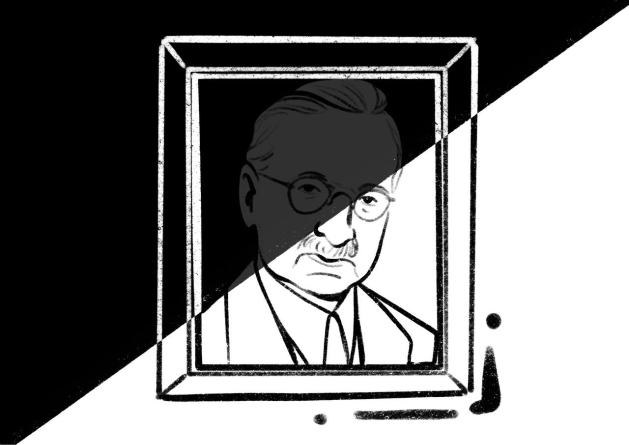
‘So he’s alive, isn’t he?’ the Angel exclaimed in amazement.
‘Nothing is impossible for those who can move between dimensions,’ the Elder smiled mysteriously and began to play the piano.
‘In the mid-1980s, string theory acquired a majestic and harmonious form, but inside this monument, confusion reigned. In just a few years, as many as five versions of string theory emerged. And although each of them is built on strings and extra dimensions, in detail all these versions differ significantly. In some versions, the strings have open ends, in others they resemble rings. In some versions, the theory requires not even 10, but as many as 26 dimensions. The paradox is that all five versions can be called equally correct today. But which of them really describes our Universe remains a mystery to this day.’
‘It’s so similar to all the particle movement,’ the Angel, anticipating another discovery, began to rush around the room. ‘The closer we get to them, the further they are from us, like you and me.’
‘And the theories that describe all this are becoming more and more fantastic,’ said the Creator, having finished playing the piano. ‘Some scientists still say that there is a very minimal, but still a possibility to test the hypothesis about additional dimensions on the next generation of accelerators. But before that, another hundred years must pass.’
The Angel approached the Elder nervously.
‘But how can one believe in this, Father?’
The Elder smiled, took the Wingless Angel by the hand and led him to the window, beyond which the dark abyss still stretched.
‘And how do people believe in us?’
The gray figure of the physicist appeared again behind the Creator and the former Angel. The figure quickly looked out the window, then walked up to the chess table and wrote a phrase on a sheet of old paper that someone had forgotten:
‘Shut up and calculate!’
The cell divides into the nucleus and cytoplasm. Our journal divides into interesting facts and discoveries.
Thank you!




